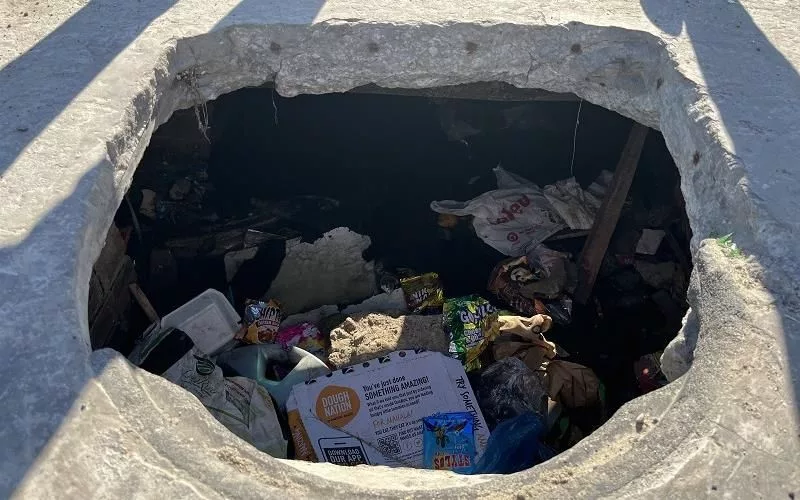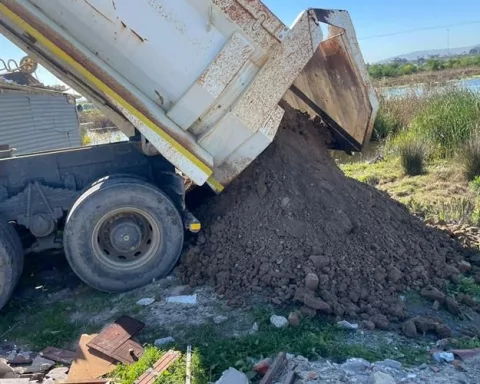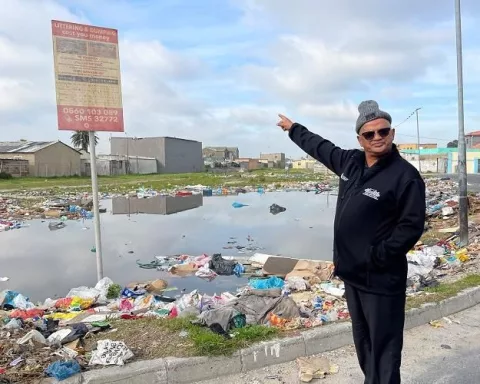Cape Town is struggling with illegal dumping, which damages the city’s stormwater infrastructure during heavy rainfall. This careless behavior threatens the city’s structural integrity and requires substantial public funds to repair. Residents can report incidents of illegal dumping, blocked stormwater infrastructure, and potholes through the City of Cape Town app, customer call centre, or official website. It is essential for everyone to understand the severe consequences of reckless waste disposal and take responsibility for safeguarding the surroundings.
Cape Town is facing a rising problem of illegal dumping, which has severe repercussions on the city’s stormwater infrastructure, particularly during heavy rainfall. Irresponsible waste disposal threatens the city’s structural integrity, and repairing the compromised road infrastructure requires substantial public funds. Residents can use the City of Cape Town app, customer call centre, or official website to report incidents of blocked stormwater infrastructure, illegal dumping, and potholes. The responsibility of safeguarding the surroundings rests with each one of us.
The Consequences of Reckless Waste Disposal
Cities globally, including Cape Town, are faced with the rising menace of illegal dumping. This careless behavior has severe repercussions, particularly on the city’s stormwater infrastructure. The effects are more pronounced during the winter season when the city experiences heavy rainfall, leading to increased flooding and destruction of infrastructure. Essentially, illegal dumping is a reckless act that threatens the city’s structural integrity.
The harmful effects of illegal dumping on the city’s roads can be mitigated only through a comprehensive and multi-faceted approach. It is essential for the residents to understand the severe consequences of such practices. The responsibility of ensuring responsible waste disposal lies with each one of us. The City’s Mayoral Committee Member for Urban Mobility, Councillor Rob Quintas, has urged residents to be mindful of their waste disposal practices. He has encouraged residents to observe and report any instances of waste being irresponsibly dumped in the city’s stormwater infrastructure.
Types of Waste and Their Impact
The waste dumped illegally typically consists of construction debris, household junk, and hazardous substances. These items are often irresponsibly discarded on the roadsides, vacant plots, and even in water bodies. Such thoughtless actions not only desecrate the environment but also create significant challenges during the monsoon season. The stormwater drains in Cape Town get clogged due to the accumulation of waste, leading to extensive road flooding during heavy rains.
The surplus rainwater, coupled with the waste build-up, exerts a severe strain on the road networks. The road surface tends to weaken due to excessive water exposure, resulting in the formation of potholes. The water infiltrating the asphalt causes the road to disintegrate and erode. Roads are designed meticulously with specific drainage capabilities to ensure their structural integrity. However, when the water accumulation surpasses the road’s design capacity, the foundational layers are undermined, leading to cracks and subsidence. Moreover, consistent exposure to water, along with the weight of vehicles, accelerates the degradation of the road surface. This not only shortens the lifespan of the roads but also escalates maintenance costs.
The Economic and Societal Implications
The damage caused to roads due to illegal dumping and subsequent flooding has significant economic and societal implications. Repairing and maintaining compromised road infrastructure requires substantial public funds which could have been directed towards other essential services. Moreover, the deterioration in road conditions leads to increased vehicle repair costs for motorists. Traffic disruptions due to poor road conditions disturb daily commutes, resulting in lost productivity and growing frustration among residents.
Councillor Quintas has made a fervent appeal to residents to actively monitor and report illegal dumping activities. Identifying and preventing repeat offenses can significantly help in controlling this problem.
The City’s Efforts and Resident’s Role
The City of Cape Town has made it effortless for residents to report any incidents of blocked stormwater infrastructure, illegal dumping, and potholes. Residents can use the City of Cape Town app, reach out to the City’s customer call centre at 0860 103 089 or log a service request on their official website, www.capetown.gov.za/servicerequests.
The responsibility of safeguarding our surroundings rests with each one of us. By being vigilant and promptly reporting any irresponsible waste disposal activities, we can ensure the safety and resilience of our beautiful city, especially during the challenging winter season.
1. What is the problem Cape Town is facing with regards to waste disposal?
Cape Town is facing a rising problem of illegal dumping, which has severe repercussions on the city’s stormwater infrastructure, particularly during heavy rainfall.
2. What are the consequences of reckless waste disposal?
Reckless waste disposal threatens the city’s structural integrity, and repairing the compromised road infrastructure requires substantial public funds.
3. What types of waste are commonly dumped illegally in Cape Town?
Construction debris, household junk, and hazardous substances are the types of waste commonly dumped illegally in Cape Town.
4. What are the economic and societal implications of the damage caused to roads due to illegal dumping and subsequent flooding?
Repairing and maintaining compromised road infrastructure requires substantial public funds which could have been directed towards other essential services. Moreover, the deterioration in road conditions leads to increased vehicle repair costs for motorists.
5. How can residents report incidents of illegal dumping, blocked stormwater infrastructure, and potholes in Cape Town?
Residents can report incidents of illegal dumping, blocked stormwater infrastructure, and potholes through the City of Cape Town app, customer call centre, or official website.
6. What is the role of residents in safeguarding the surroundings?
The responsibility of safeguarding the surroundings rests with each one of us. By being vigilant and promptly reporting any irresponsible waste disposal activities, we can ensure the safety and resilience of our beautiful city, especially during the challenging winter season.












